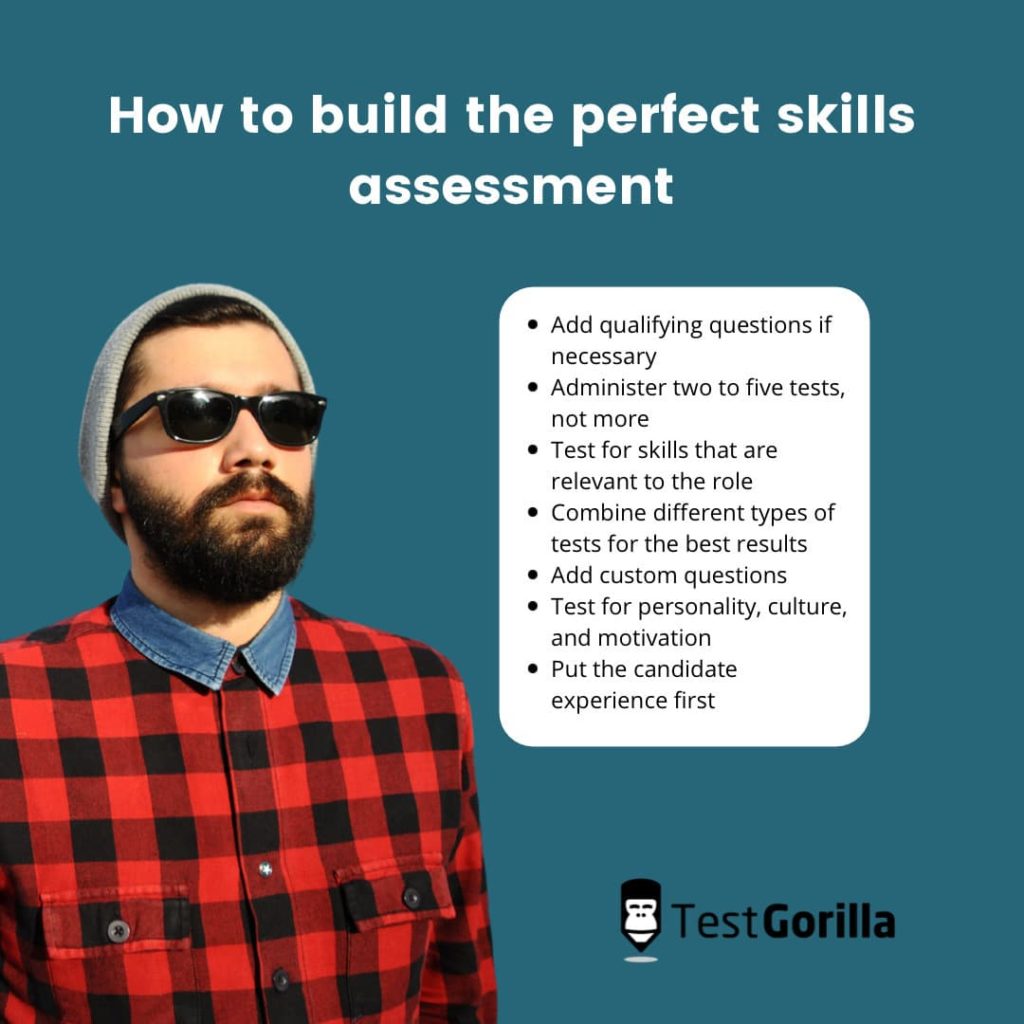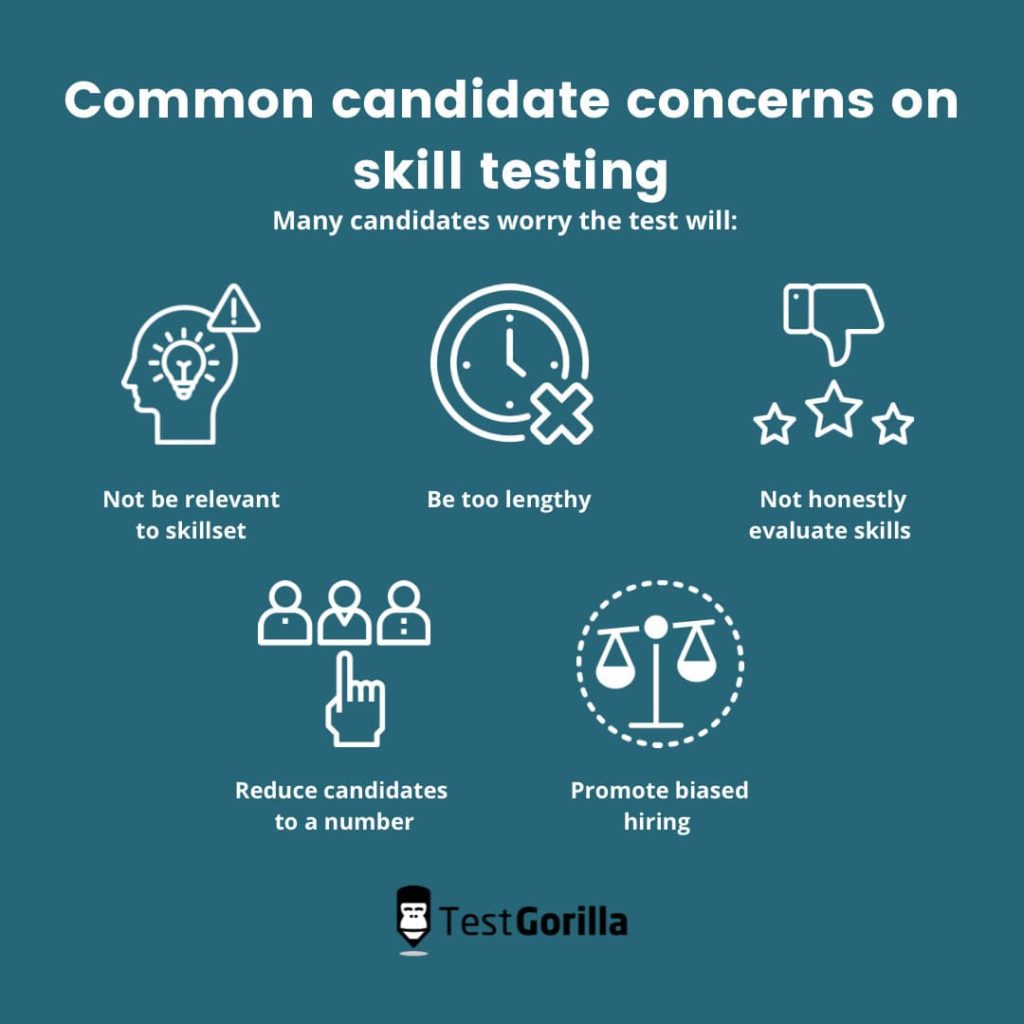Skill testing concerns: What if candidates don’t like it?
Pre-employment tests help companies make better hiring decisions and expedite the recruitment process, but let’s face it – not every candidate will be excited about having to take one.
Many believe that tests are inefficient, or that they’d limit their skills to just a single score, or they might simply be anxious about taking a timed assessment.
As a result, recruiters also fear turning away otherwise highly qualified applicants if they require them to complete a skills assessment.
Are candidates’ concerns justified, and how can you, as a recruiter, address them? For example, will tests help applicants demonstrate their skills, talent, and potential reliably? On the other hand, will they unfairly “punish” candidates who lack a specific personality trait, such as extraversion?
Can companies confidently rely on skills tests to measure both technical skills and culture add? What are the possible drawbacks of skill testing, and how can recruiters avoid them?
We’ll answer all of these questions — and more — in this article.
Table of contents
- The test and the candidate: Pre-employment assessments’ benefits for candidates & employers
- When to test for skills
- What to test for and how to build the perfect skills assessment?
- Common candidate concerns on skill testing
- How does skill-testing help candidates?
- Improving the candidate experience
- Begin with assessing your own team first
The test and the candidate: Pre-employment assessments’ benefits for candidates & employers
Depending on the position, resumes or cover letters may be an incredibly ineffective method of screening candidates.
You might fail to identify some of your most talented and skilled applicants if you’re relying too heavily on diplomas and past work experience. If you’re hiring globally, depending on CVs might prove counterproductive.
Skills tests give all applicants an equal opportunity by reliably demonstrating their skills and abilities and enabling recruiters to make data-driven unbiased decisions.
1. Tests help candidates show their true strengths and potential
Pre-employment tests help reduce your reliance on CVs and cover letters while also allowing your candidates to shine by allowing them to exhibit their skills, knowledge, and expertise, regardless of their background. This helps you make fairer and less biased hiring decisions.
Consider this — would you rather hire:
Someone with a diploma in Marketing from 10 years ago and some experience that seems relevant but is impossible to verify, or
Someone who has effectively handled a variety of initiatives in the past year and is constantly improving their digital marketing capabilities (but lacks the diploma or the years of experience to back up their application)?
The choice is obvious, right?
2. Tests help hire a remote workforce confidently
How can you confidently hire remote employees if you have no clue how much their university degree is worth or have never heard of the companies where they’ve worked? Should you simply disregard them? Let your competitors hire the best workers? Hire those who performed well in the interview and hope for the best?
Skills tests allow you to evaluate everyone’s skills in a given field or assess their cognitive abilities (such as verbal reasoning, problem-solving, or attention to detail).
You should consider this factor, especially if you’re hiring remotely, as many companies do these days – including Adobe, American Express, Apple, and Cisco (and even TestGorilla: our team is distributed across over 20 countries and five continents!). These tests help you identify global talent and allow remote applicants to prove their skills.
3. Tests help you assess someone’s potential and cognitive abilities
Skill testing allows you to evaluate candidates’ potential by assessing their cognitive skills and, in turn, their capacity to learn new skills. Additionally, psychometric tests help you gain a deeper understanding of applicants’ potential for culture add and personality traits like conscientiousness or extraversion, which can help predict job performance, at least to some extent. (You can find more on that topic in our article on the Big Five test and job performance.)
Of course, you shouldn’t make hiring decisions based on the results of personality and culture tests; you should only use them to understand your applicants better and manage new hires effectively in the future.
When to test for skills
Pre-employment assessments need to be managed carefully to be effective, and we’ll go over this in more detail in this section.
Tests should be conducted early in the recruitment process (ideally as the first step) and certainly before you spend time interviewing candidates. There’s no reason to waste time on applicants who simply don’t meet your qualification criteria.
Interviews are incredibly resource-intensive and time-consuming. Although, of course, they can provide you with invaluable information about your applicants.
Nevertheless, if you interview too many individuals, your time-to-hire will inevitably suffer, as will your potential to acquire top talent.
With skills assessments, you’re able to quickly identify the candidates who have the proper skill set for the role and focus on them exclusively during the interview stage.
This way, you can cut your time-to-hire and the cost-per-hire (which, according to an SHRM report, are currently averaging at 36 days and $4,425, respectively) while also optimizing your recruiting process.
The best insights on HR and recruitment, delivered to your inbox.
Biweekly updates. No spam. Unsubscribe any time.
What to test for and how to build the perfect skills assessment?
Creating the perfect skills assignment may appear to be a daunting task, which is why we’ve developed a straightforward approach to guide you through the process.
In our test library, you can search for specific roles and the tests that are best suited for them and by test type (cognitive ability tests, personality and culture tests, programming skills, and so on).
This enables you to develop an assessment that is highly relevant to the role you’re looking to fill while also creating a positive candidate experience by demonstrating that you value their time, skills, and experience.
Here are some tips for building the perfect skills assessment:
1. Add qualifying questions if necessary
You might have specific requirements that candidates must meet to be considered for the position, for example, having a driver’s license, a specific professional qualification, or being available full-time.
It makes sense, in this situation, to include qualifying questions before candidates spend time going through the skills assessment. This way, you won’t waste their time (and yours), and you’ll save money because you’ll only be charged for candidates who pass the qualifying questions.
2. Administer two to five tests, not more
You risk overwhelming your candidates if you administer too many skills and personality tests. According to SHRM, the complexity and the time required to complete applications are among the top factors that drive application abandonment. So keep your assessments short and to the point by conducting a maximum of five tests.
3. Test for skills that are relevant to the role
Once you select a role you want to administer tests for, TestGorilla will give you test recommendations. Make sure you administer at least one or two tests that are highly relevant to the job opening to help you proactively weed out unqualified applicants.
4. Combine different types of tests for the best results
Assessments provide you with a comprehensive overview of someone’s skills, knowledge, and abilities, but you must use a range of tests to assess them accurately. According to Harvard Business Review, multi-measure exams provide the most reliable results for recruiters to predict job performance potential.
5. Add custom questions
Our platform allows you to add custom questions to each test or even request the candidate to record a short video response or upload a file (a portfolio, for example, if you’re looking to hire a graphic designer). With video responses, you can get an idea of how candidates would perform during an interview, which helps you further narrow your selection and personalize the assessment.
6. Test for personality, culture, and motivation
You can analyze someone’s culture add potential, their motivation, or get a deeper understanding of how they function with our personality and culture tests. But, of course, you shouldn’t base your hiring decisions only on personality and culture tests; instead, you should use them as one of the many tools to understand your applicants better.
To guarantee a positive candidate experience, make sure you offer prospective enough applicants adequate context: explain to them why you’re administering a personality or culture test and that there aren’t any right or wrong responses.
7. Put the candidate experience first
Providing a positive candidate experience is essential to your employer’s brand image, and one of the primary issues with skill testing is the concerns about tests (more on that later). As a result, you must optimize your hiring process for your candidates and ensure that it’s clear, transparent, and easy to navigate.
Give your applicants detailed information about the skills tests you’re administering, as well as the purpose of doing so: to provide an equal opportunity to all candidates and make a selection based on skills and abilities. In other words, show them that testing helps them shine and isn’t just an arbitrary metric you’re using to complicate the hiring process.
Common candidate concerns on skill testing
Candidates might feel intimidated by the idea of taking a skills assessment or be mistrustful.
Sometimes, tests might even lead to a false negative, similarly to interviews. For example, if someone has performance anxiety, they might fail the test even if they’d otherwise perform well at the job. Applicants might also mistrust the testing process or aim to create a “desirable” image of themselves while taking personality tests.
All of these factors may result in lower test scores. This is why it’s critical to address candidate concerns about skill testing issues by proactively explaining to them:
Why you’re using tests in the hiring process
What to expect from the assessment
How tests help you provide an equal opportunity to all candidates
How results will be measured
Assure them that the results of these tests will be kept confidential and won’t be used for any other purpose outside of your hiring process.
Let’s now look into some common applicants’ concerns about skill testing.
1. The tests are not relevant to their skillset
Some candidates may have had negative experiences, such as being assessed for the personality you proactively or receiving irrelevant tests to their competence or the position.
For this reason, it’s critical to select tests that are directly related to the requirements for the vacancy, as specified in the job ad.
2. Tests are too lengthy and time-consuming
Tests are designed to achieve the proper balance between the time a candidate invests in applying and providing employers with reliable results that help predict job performance.
Most of our tests take ten minutes to complete, so if you give three tests, this means that the skill-testing process will take half an hour. Be upfront about the number of times candidates will need to spend on pre-employment tests: this shows them that you value their time and efforts.
If the entire process is managed correctly, testing should reduce the time it takes to hire and help both candidates and recruiters save time.
3. The questions do not honestly evaluate their skills
Questions vary in difficulty and are intended to be balanced: they’re neither too easy nor too challenging. Subject-matter experts develop our tests, and their quality is continuously monitored to ensure that highly competent candidates have the opportunity to demonstrate their skills reliably.
Additionally, you can add custom questions to personalize the tests or request a video response. This will give you a feel of how someone would perform at an interview while also showcasing their communication and presentation skills.
4. Tests reduce candidates to a number
Pre-employment skill assessments provide a far more thorough overview of someone’s skills, abilities, and personality than a CV or a cover letter.
Similarly, relying too much on information in CVs, recruiters are far more likely to limit candidates to a diploma or their previous work experience. On the contrary, tests allow candidates to demonstrate their skills rather than be reduced to their formal qualifications.
5. Personality tests promote ‘biased’ hiring
This is a typical concern among candidates, and they might try to create a version of themselves that they believe would be desirable for your company.
In reality, personality tests aren’t intended to be used as an evaluation tool, and you shouldn’t base recruitment decisions on them. Instead, use them to gain a more in-depth understanding of candidates’ traits, behavior, and motivations. Make sure you communicate this to prospective employees and explain that you expect to see any specific personality characteristics.
How does skill-testing help candidates?
Pre-employment skills assessments benefit candidates in several ways, which we’ll discuss in more detail in this section.
1. Qualified candidates can stand out and shine
Skills tests allow candidates to compete for a job opening based on their skills, abilities, and competence, not on diplomas or degrees. This way, the best candidates can demonstrate their capabilities and stand out from the crowd confidently.
2. It promotes equal opportunity employment
You hire skills assessments based on competence and skills, which helps you reduce unconscious bias and hiring discrimination. This way, you’re giving all candidates an equal opportunity, allowing you to hire a diverse workforce and create an inclusive workplace.
3. Skill assessments are forward-looking
Instead of sifting through hundreds of CVs and cover letters, which forces you to rely too much on diplomas and work experience at the “right” companies, skills assessments allow you to look into candidates’ actual skills and potential. Additionally, skills tests will enable you to give a fair shot.
They also allow you to proactively assess someone’s advancement a few months after you hire them: just re-evaluate a specific skill to determine if they’re making progress.
4. Fairness: Putting talent first
According to a Monster survey from 2019, 85% of recruiters agree that applicants exaggerate their abilities on resumes. Tests assist hiring managers in identifying their most skilled candidates and making fair decisions that put talent first.
Improving the candidate experience
Assessments help you improve the candidate experience by showing your candidates that you value:
Their skills and expertise
Their talent and potential
The time and effort they put in applying for your opening to
There are a few steps you can take to improve the candidate experience further.
1. Customize the invite to give context and an explanation
You can customize the content of the email when you’re inviting applicants to take an assessment to let your candidates know why you’re administering skill and personality tests.
This allows you to:
Increase the transparency and clarity of the recruiting process
Reduce performance anxiety and skepticism
Provide information on how you will evaluate candidates’ skills
Include a deadline
You can add a welcome video to personalize your invite further and improve the candidate experience.
2. Customize skills assessments with your own logo and colors
You can customize TestGorilla’s skills tests with your own brand logo and colors. Again, this helps personalize the skills assessment and provide a positive candidate experience by ensuring that your style, messaging, and brand image are consistent and harmonious.
3. Keep candidates updated on their progress
Always keep your candidates up to date on their progress, and keep rejected applicants informed of the status of their application. Most companies don’t do that: 75% of candidates never hear back from recruiters after applying.
This implies that keeping prospective employees informed it’s a great way to differentiate yourself and show them you value their time. You can automate this step to simplify and speed up the process.
Begin with assessing your own team first
When establishing a benchmark which you can measure applicants, first assess your own team and its performance.
Look at the performance of your best employees. What did they excel at? What makes them unique? What are the top skills that make them stand out?
This way, you’ll be able to design a skills assessment process that aligns with your goals and corporate culture and better understands and manage your own team.
Skills and personality tests are not meant to replace decision-making but rather enhance it and make it more data-driven, fair, and unbiased. This way, you’ll also be able to provide a better candidate experience too.
With TestGorilla, you’ll find the recruitment process to be simpler, faster, and much more effective. Get started for free today and start making better hiring decisions, faster and bias-free.
You've scrolled this far
Why not try TestGorilla for free, and see what happens when you put skills first.


















